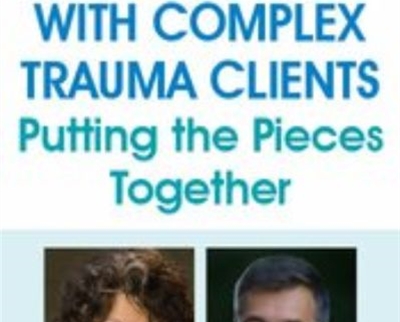$219.99 Original price was: $219.99.$83.00Current price is: $83.00.
12 Hours 57 Minutes
Successful treatment of complex trauma requires being able to work with all parts of your clients—the parts that clients identify with as “me” and the disowned parts they have despised, disowned or dissociated.
 Purchase this course you will earn 83 Points worth of $8.30
Purchase this course you will earn 83 Points worth of $8.30Elevate your skills with the Working with Complex Trauma Clients: Putting the Pieces Together – Janina Fisher & Frank Anderson course, available for just $219.99 Original price was: $219.99.$83.00Current price is: $83.00. on Utralist.com! Browse our curated selection of over 60,000 downloadable digital courses across diverse Uncategorized. Benefit from expert-led, self-paced instruction and save over 80%. Start learning smarter today!
Successful treatment of complex trauma requires being able to work with all parts of your clients—the parts that clients identify with as “me” and the disowned parts they have despised, disowned or dissociated.
Without giving voice to all parts and resolving the conflicts between them, your treatment efforts can fall short, leaving clients to continue their daily struggle with suicidality, self-harm, addiction and other self-destructive behaviors.
Internal Family Systems (IFS) and Trauma-Informed Stabilization Treatment (TIST) are two of the most effective evidence-based tools available to clinicians today for safely and effectively working with clients’ trauma-related parts.
And this 2-Day online workshop is your chance to train with two of the biggest names in the trauma field as they share the demonstrations, case studies and tips you need to bring the power of these clinical approaches into your own practice!
Watch Frank Anderson, MD, IFS Institute lead trainer and program consultant and Janina Fisher Ph.D., international trauma expert and creator of Trauma-Informed Stabilization Treatment as they show you how you can use these contrasting yet complementary approaches to:
- Understand complex and unstable clients as systems of fragmented parts
- Overcome roadblocks to working with extreme symptoms of trauma
- Re-interpret self-destructive behavior as the actions of protector parts
- Repair the injuries of traumatized child parts
- Bring curiosity and compassion to habitual states of hopelessness, shame and self-blame
- Heal wounds caused by repeated relational violations.
Don’t miss the opportunity to join not one, but two legendary trauma clinicians and trainers.
Purchase today and feel more confident than ever before in working with all your trauma clients’ parts!
- Assess clients for signs and symptoms indicative of parts and/or their internal conflicts.
- Stabilize at-risk clients with the Trauma Informed Stabilization Treatment Model.
- Articulate the Internal Family Systems model for working with parts in therapy.
- Assess the pros and cons of psychoeducation for client understanding of parts.
- Formulate parts structure as they manifest in thoughts, emotions, body sensations and actions.
- Evaluate parts that sabotage self-compassion or self-acceptance.
- Implement mindfulness-based techniques to increase internal awareness.
- Overcome the disruptive influence of extreme protective parts.
- Implement techniques for increasing ‘self-energy’.
- Utilize interventions that create an increased sense of connection to disowned parts.
- Manage the common roadblocks and pitfalls that interfere with the effective healing of early attachment wounds.
- Demonstrate techniques IFS and TIST techniques that may facilitate ‘self-healing for trauma clients.
DAY ONE
Workshop Overview: Frank Anderson and Janina Fisher
Trauma and Dissociation [Fisher]
- Dissociation and fragmentation as normal responses to trauma
- How fragmentation aids survival and adaptation
- Repeated re-activation of trauma responses and traumatized parts in the context of safety
Trauma-Informed Stabilization Treatment (TIST) [Fisher]
- Applying a parts model to personality disorders and complex PTSD
- The Structural Dissociation Model
- Re-interpreting client symptoms as manifestations of parts
- Mindfulness-based techniques for working with parts
- Stabilization of symptoms and impulses
- State of the evidence, risk and limitations of the model & application in clinical practice
Internal Family Systems [Anderson]
- IFS Model
- Parts and psychopathology
- The 6 F’s, working with protective parts
- State of the evidence, risk and limitations of the model & application in clinical practice
Trauma and Dissociation, cont. [Anderson]
- The Neurobiology of PTSD and Dissociation
- Overcoming roadblocks, working with extreme symptoms of trauma
- Overcoming roadblocks, working with extreme symptoms of trauma
- Beyond the 6 F’s in IFS
DAY TWO
Self-Leadership in IFS [Anderson]
- Therapist parts
- The dimensions of Self-Energy
- Differentiating empathy from compassion
Healing from Within [Anderson]
- The healing process in IFS
- Unloading family of origin and cultural burdens
- Rewiring implicit emotional memory
Repairing the Injuries of Traumatized Child Parts [Fisher]
- Developing internal communication
- Concept of ‘missing experiences’
- Developing client ability to offer reparative experiences to parts
- Welcoming the parts home now
Contrasting Approaches to working with Parts [Fisher, Anderson]
- Sharing reactions to video excerpts
- Discussion of strengths and limitations of each approach
- Participant Q&A
Get Working with Complex Trauma Clients: Putting the Pieces Together – Janina Fisher & Frank Anderson, Only Price $87
Tag: Working with Complex Trauma Clients: Putting the Pieces Together – Janina Fisher & Frank Anderson Review. Working with Complex Trauma Clients: Putting the Pieces Together – Janina Fisher & Frank Anderson download. Working with Complex Trauma Clients: Putting the Pieces Together – Janina Fisher & Frank Anderson discount.complex trauma definition
complex trauma disorder, complex trauma meaning, complex trauma icd 10, complex trauma inventory.
Cultivate continuous growth with the Working with Complex Trauma Clients: Putting the Pieces Together – Janina Fisher & Frank Anderson course at Utralist.com! Unlock lifetime access to premium digital content, meticulously designed for both career advancement and personal enrichment.
- Lifetime Access: Enjoy limitless access to your purchased courses.
- Exceptional Value: Benefit from savings up to 80% on high-quality courses.
- Secure Transactions: Your payments are always safe and protected.
- Practical Application: Gain real-world skills applicable to your goals.
- Instant Accessibility: Begin your learning journey immediately after buying.
- Device Compatible: Access your courses seamlessly on any device.
Transform your potential with Utralist.com!
Related products
Uncategorized
Managing Geriatric Behaviors: Wandering, Aggression, Malnutrition and More – Steven Atkinson
= 35 Points
Uncategorized
= 85 Points
= 65 Points
Uncategorized
Proven Fall Prevention Strategies: Exercise, Meds Management and Home Modification – Trent Brown
= 40 Points
= 85 Points
Uncategorized
Managing Patient Emergencies: Critical Care Skills Every Nurse Must Know – Dr. Paul Langlois
= 85 Points
Uncategorized
Disordered Eating Behaviors: Identify and Treat the Underlying Trauma – Lori Kucharski
= 85 Points
Uncategorized
= 30 Points





